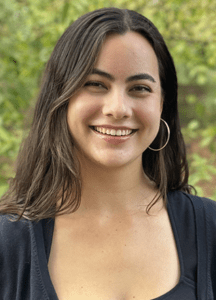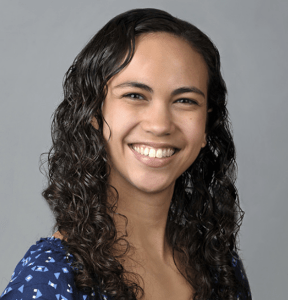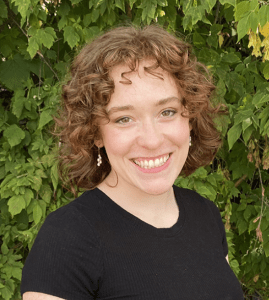anjniamin2014@u.northwestern.edu
Anjni Amin’s research engages a range of topics, including expressive performance, music theory pedagogy, world music pedagogy, and music education. Her dissertation examines the development of expressive interpretation skills through interaction between performer-pedagogue and student in the collegiate performance studio. She has presented her research at the International Conference for Music Perception and Cognition and the International Conference on Analytical Approaches to World Music, as well as at meetings of the College Music Society and the Society for Ethnomusicology. Her work dealing with both music theory and world music pedagogy is published in The Routledge Companion to Music Theory Pedagogy. Prior to her doctoral studies, she earned her B.S. in music education from The College of Saint Rose and her M.M. in music theory from Northwestern. Currently, Anjni is on the faculty at Oberlin College & Conservatory teaching theory and aural skills.
Sara Bowden, PhD Candidate
SaraBowden2019@u.northwestern.edu
Sara Bowden grew up at the base of the Great Smoky Mountains National Park in Maryville, TN. They earned their undergraduate degree in Music Theory from The University of North Texas (B.M. 2018, Thesis: “Kill or Be Killed: Music as a Moral Catalyst in Toby Fox’s Undertale”) and their master’s degree in Music Theory and Cognition from Northwestern University (M.M. 2019, Thesis: “Narrative Transformation and Music in Mediatized Moral Space in Charlie Brooker’s Bandersnatch”). Their research interests include sound studies and public cultures, video game music and affect, and players’ encounters with video game music as enriched by music’s relationship to rhetoric in the visual novel category. Their published work on musical disruption in psychological horror games may be read in The Soundtrack. They have presented papers at regional, national, and international conferences including IASPM-ANZ, Music and the Moving Image, and Music Theory Midwest. Outside of their academic pursuits, Sara is an in-demand marching arts educator, choreographer, and guest clinician. As an educator in the Chicago area, Sara currently works as a field instructor for the seven-time Bands of America Grand National Champion Marian Catholic High School Marching Band. An active performer, they are a trombonist for the Clamor & Lace Noise Brigade, Chicago’s first street band comprised solely of women and non-binary performers.
 Leo Casti, 3rd-Year PhD
Leo Casti, 3rd-Year PhD
LauraCasti2021@u.northwestern.edu
Leo Casti ’21 MMus is a native of Sardinia, Italy, where they worked as an orchestral musician and high school music teacher until moving to the USA in 2019. They holds three artist diplomas “vecchio ordinamento” – old system- in harp, choral conducting, and composition; two bachelor’s degrees in orchestral conducting and tourism; two master’s degrees in composition and modern languages obtained – all seven with top grades, four of them with honors – in the Italian conservatories/universities of Torino, Sassari, and Trapani. Casti has won national and international contests as a harpist and their composition master has been subsidized by the foundation CRT of Torino. Their previous researches in music theory involved the relationship(s) between musical and linguistic phraseology, Gestalt theory and music perception, and the use of past-related quotations in polystylistic music of the 21st century. Having been a passionate teacher of music theory and composition at the Liceo “D.A.Azuni” in Sassari, Casti would also love to dive deep into the compositional techniques of the Neapolitan school and partimento art of the 18th century, to help disclose that well-crafted music is not only a prerogative of “musical genius” but that it is accessible to every highly trained musician.
 Lena Console, PhD Candidate
Lena Console, PhD Candidate
LenaConsole2023@u.northwestern.edu
A native of Cleveland Heights, Ohio, Lena Console holds two bachelor’s degrees from Indiana University Jacobs School of Music: a Bachelor of Music in Trumpet Performance and a Bachelor of Science in Music Theory & Philosophy. After a lifetime in the Midwest, Lena spent four years working and performing in Seattle, Washington. There she worked as a research coordinator for the University of Washington Institute for Learning & Brain Sciences, researching impacts of group music-making on children’s empathy and pro-social behavior; and as a teaching artist for various organizations, including the Seattle Symphony, where she piloted a community composition residency program with adults who are facing homelessness. As a trumpet performer, her experiences range from historical performance to modern jazz and rock covers. Lena’s current research interests focus on the intersections between aesthetic perception and mindfulness, exploring cognitive components such as attention, memory, and expectation. Also passionate about community engagement, Lena hopes to develop her academic research to create accessible programs for those outside of academia.
 Laine Gruver, 3rd-Year PhD
Laine Gruver, 3rd-Year PhD
LaineGruver2026@u.northwestern.edu
Laine Gruver is from Mill Valley, California, and earned her B.S. in Neuroscience at the University of California, Los Angeles in 2020. At UCLA, she merged her studies of neuroscience with music by designing and teaching her own seminar course within the Department of Musicology, entitled ‘Psychomusicology: How Music and the Brain Create Our Experienced Reality.’ She additionally completed an independent ecomusicology research project in which she examined how the scores of the BBC’s Planet Earth and Planet Earth II aimed to evoke different empathetic reactions from viewers. Particularly fascinated with the listening experience, Laine intends to center her research at Northwestern on musical memory and nostalgia, especially in regards to how they help cultivate our personal taste in music. She is also intrigued by issues of gender as they intersect with popular music, and hopes to explore those issues through a certificate in Gender and Sexuality Studies.
 Hunter Hoyle, 2nd-Year PhD
Hunter Hoyle, 2nd-Year PhD
HunterHoyle2027@u.northwestern.edu
Hunter Hoyle is from Sanford, North Carolina. Prior to arriving at Northwestern, he graduated from the University of North Carolina at Chapel Hill in 2022, receiving a B.M. in Music Education and Piano Performance and a B.A. in Psychology. Hunter’s research interests include the perception and cognition of musical form, the effect of timbre on the perception of musical categories, and the practical applications of music-cognitive research to music theory and aural skills pedagogy. Passionate about interdisciplinary research, his senior honors thesis, “Sonata Form Revisited: Towards a Cognitive Theory of Formal Interference,” draws upon schema theory, cognitive dissonance theory, and gestalt theory as a means of reexamining Hepokoski and Darcy’s sonata theory through the lens of music cognition. Another one of Hunter’s papers, “Maximizing Form in Minimalism: Psychological Form as Narrative in Philip Glass’s Etude No. 6,” uses David Huron’s 2013 habituation-fluency theory of repetition to illustrate how formal manipulations of textural density and metrical dissonance can be perceived as conveying narrative in minimalism, a musical style that has historically been viewed as “antiteleological.” Hunter’s work has been presented at annual meetings of the Music Theory Society of the Mid-Atlantic, the West Coast Conference of Music Theory and Analysis, and the International Conference on Music Perception and Cognition.
 Kim Kawczinski, 1st-Year PhD
Kim Kawczinski, 1st-Year PhD
KimberlyKawczinski2028@u.northwestern.edu
Kim Kawczinski is interested in examining how musical features come to develop personal and cultural significance via repetition, ritual, and embodiment. Kim holds an M.A. in Music, Science, and Technology from Stanford University and an A.B. in Music with a double major in Physics from the University of Chicago. She has also worked in industry in the audio technology research space. Kim has previously worked on acoustical space, room reverberation, and spatial audio, including her undergraduate thesis (“On Interpreting Acoustic Space in Contemporary Musical Performance Practice”) and publications with the Audio Engineering Society and the Journal of the Acoustical Society of America. Kim also plays the violin and composes.
 Amy King, 2nd-Year PhD
Amy King, 2nd-Year PhD
Amy King hails from Oak Ridge, North Carolina. In 2016, she earned her B.A. in Piano Performance and English Literature from High Point University and went on to complete her M.M. in Music Theory and Cognition from Northwestern University in 2020. Her master’s thesis, “Sounds of Poetry in Britten’s ‘Death, be not proud’”—which she also presented at various conferences—combines her love of poetry with musical sound, meaning, and interpretation. Her current research focuses on linguistic approaches to music theory, particularly in regards to communication, meaning, and emotion in music. Amy also engages in public music theory and is an advocate for accessibility and diversity in music education.

Morgan Patrick, PhD Candidate
MorganPatrick2023@u.northwestern.edu
Morgan Patrick is a second-year PhD student from Westport, Connecticut. At Brown University he created an undergraduate degree in music cognition, graduating with an interdisciplinary honors thesis in the Departments of Music and Cognitive, Linguistic, & Psychological Sciences. There, his research focused on parallels between Western tonality and the cognition of visual narrative structure. Patrick’s current research investigates how musical form guides attention during real-time listening and during multimedia experiences of narrative. He is also interested in the cognitive mechanisms that underlie theme learning in film and concert music, especially as they relate to the psychology of expectation and immersion.
 Emily Schwitzgebel, PhD Candidate
Emily Schwitzgebel, PhD Candidate
EmilySchwitzgebel2025@u.northwestern.edu
Emily Schwitzgebel’s current research focuses on expectation in music, with intersections in music and emotion, music and language, and uses of computational modeling. She has presented at conferences held by the Society for Music Perception and Cognition and the Northeast Music Cognition Group, as well as at the annual Music and Informatics interest group meeting hosted by the Society for Music Theory. Prior to her studies at Northwestern, Emily earned a Bachelor of Music in Music Theory and Composition from the College of Wooster, and a Master of Music in Music Theory from the University of Massachusetts Amherst. A strong advocate for interdisciplinary research, she aims to engage with several fields of study, drawing on her research expertise to bridge the gap between scholarship and pedagogy.
 Michael Slattery, 4th-Year PhD
Michael Slattery, 4th-Year PhD
MichaelSlattery2020@u.northwestern.edu
Michael Slattery is from Hartland, Michigan. He holds a Bachelor of Music in Music Theory and a Bachelor of Arts in Mathematics, both from Northwestern University. His work there as an undergraduate included a project, funded by the Office of Undergraduate Research, on sacred quotations and topical content in the symphonies of Anton Bruckner as well as a senior thesis on virtual agency in the Mozart Clarinet Quintet. Michael is interested in understanding the construction of musical meaning through an variety of approaches, particularly topic theory and theories of form. Outside of his academic life, he has worked as a collaborative pianist for voice lessons at Northwestern.
 Emily Warkentin, 1st-Year PhD
Emily Warkentin, 1st-Year PhD
EmilyWarkentin2029@u.northwestern.edu
Emily Warkentin is from Dripping Springs, Texas. She holds a BA in Music and Psychology from Trinity University. Her research strives to meld cognitive and linguistic perspectives with musical analysis to explore musical meaning in childhood, perception and learning, and late-life memory. Her undergraduate work included a children’s language research publication in Brain Sciences Journal and a senior thesis on the prominence of the Ziffersystem—a numerical music notation—in 18th-19th century Russian Mennonite choral communities. An active pianist, composer, and choral singer, Emily fuels her research interests with a deep love for musical creativity and community engagement.

